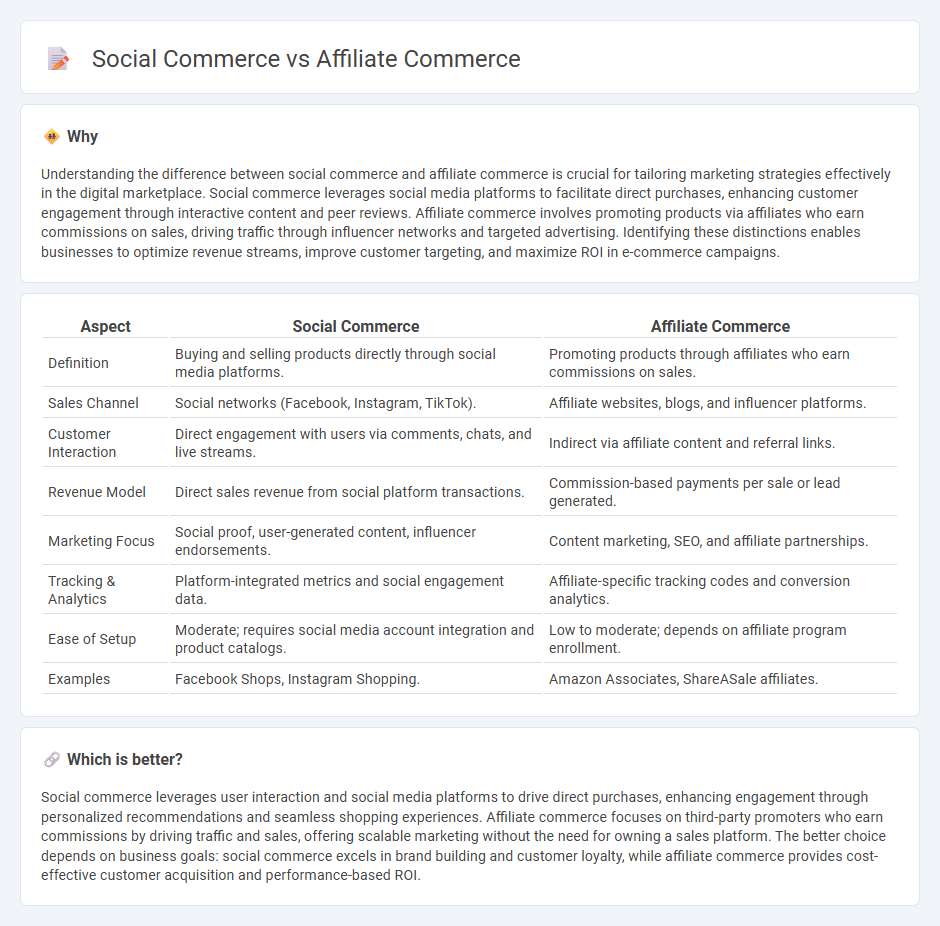
Social commerce leverages social media platforms to facilitate direct buying and selling experiences, integrating user-generated content, reviews, and social interactions to enhance customer engagement and trust. Affiliate commerce involves promoting products through affiliate marketers who earn commissions based on sales generated via their referral links, creating a performance-driven marketing ecosystem. Discover how these two commerce models are transforming online retail and boosting sales strategies.
Why it is important
Understanding the difference between social commerce and affiliate commerce is crucial for tailoring marketing strategies effectively in the digital marketplace. Social commerce leverages social media platforms to facilitate direct purchases, enhancing customer engagement through interactive content and peer reviews. Affiliate commerce involves promoting products via affiliates who earn commissions on sales, driving traffic through influencer networks and targeted advertising. Identifying these distinctions enables businesses to optimize revenue streams, improve customer targeting, and maximize ROI in e-commerce campaigns.
Comparison Table
| Aspect | Social Commerce | Affiliate Commerce |
|---|---|---|
| Definition | Buying and selling products directly through social media platforms. | Promoting products through affiliates who earn commissions on sales. |
| Sales Channel | Social networks (Facebook, Instagram, TikTok). | Affiliate websites, blogs, and influencer platforms. |
| Customer Interaction | Direct engagement with users via comments, chats, and live streams. | Indirect via affiliate content and referral links. |
| Revenue Model | Direct sales revenue from social platform transactions. | Commission-based payments per sale or lead generated. |
| Marketing Focus | Social proof, user-generated content, influencer endorsements. | Content marketing, SEO, and affiliate partnerships. |
| Tracking & Analytics | Platform-integrated metrics and social engagement data. | Affiliate-specific tracking codes and conversion analytics. |
| Ease of Setup | Moderate; requires social media account integration and product catalogs. | Low to moderate; depends on affiliate program enrollment. |
| Examples | Facebook Shops, Instagram Shopping. | Amazon Associates, ShareASale affiliates. |
Which is better?
Social commerce leverages user interaction and social media platforms to drive direct purchases, enhancing engagement through personalized recommendations and seamless shopping experiences. Affiliate commerce focuses on third-party promoters who earn commissions by driving traffic and sales, offering scalable marketing without the need for owning a sales platform. The better choice depends on business goals: social commerce excels in brand building and customer loyalty, while affiliate commerce provides cost-effective customer acquisition and performance-based ROI.
Connection
Social commerce leverages social media platforms to facilitate direct buying and selling, enhancing user engagement and trust through peer recommendations. Affiliate commerce complements this by enabling influencers and content creators to earn commissions by promoting products within their social networks. Together, these models create a synergistic ecosystem where user-generated content drives sales and affiliate partnerships expand market reach.
Key Terms
Referral (Affiliate Commerce)
Referral marketing in affiliate commerce leverages influencers or affiliates to promote products, driving traffic and sales through personalized referral links and commissions. This model focuses on targeted recommendations and incentivizes affiliates to generate high-quality leads, enhancing brand credibility and conversion rates. Explore further to understand how referral strategies can transform your affiliate commerce success.
Influencer (Social Commerce)
Influencer-driven social commerce leverages trusted personalities to directly promote products within their social networks, enhancing authenticity and conversion rates compared to traditional affiliate commerce. Social commerce integrates seamless shopping experiences on platforms like Instagram and TikTok, allowing influencers to engage followers through shoppable posts and live streams. Explore how influencer strategies in social commerce are revolutionizing online shopping and boosting brand loyalty today.
Conversion (Both)
Affiliate commerce leverages influencer partnerships and trackable links to drive high-conversion sales through targeted content, while social commerce embeds seamless purchasing options directly within social media platforms, enhancing impulse buying and user engagement. Both strategies prioritize conversion optimization by analyzing consumer behavior and employing personalized recommendations to increase click-through rates and average order values. Explore deeper insights into conversion tactics and performance metrics in affiliate and social commerce to maximize revenue.
Source and External Links
Ecommerce Affiliate Programs (2025) - Affiliates promote another company's products via their own channels and earn commissions when sales are made through their unique links, with rates typically ranging from 5% to 50% per sale depending on the program and product category.
Affiliate Programs: A Step-by-Step Guide for Ecommerce Sites - An affiliate program is a partnership where affiliates (publishers) earn commissions for driving sales to an ecommerce business, allowing merchants to expand their reach and affiliates to monetize their audience--a mutually beneficial arrangement.
Amazon.com Associates Central - The Amazon Associates Program lets content creators share millions of Amazon products with their audience using custom links and earn commissions (up to 10% depending on the category) when those links result in qualifying purchases.
 dowidth.com
dowidth.com